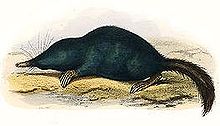Japanese shrew mole
| Japanese shrew mole | |
|---|---|
 |
|
| Scientific classification | |
| Kingdom: | Animalia |
| Phylum: | Chordata |
| Class: | Mammalia |
| Order: | Eulipotyphla |
| Family: | Talpidae |
| Subfamily: | Talpinae |
| Tribe: | Urotrichini |
| Genus: | Urotrichus |
| Species: | U. talpoides |
| Binomial name | |
|
Urotrichus talpoides Temminck, 1841 |
|
 |
|
| Japanese shrew mole range | |
The Japanese shrew mole or Himizu (ヒミズ) (Urotrichus talpoides) is a species of mammal in the family Talpidae. It is endemic to Japan and is found on Honshu, Shikoku, Kyushu, Awaji Island, Shodo Island, Oki Islands, Tsushima Island, Goto Islands, Mishima Island (Yamaguchi Prefecture), and Awashima Island (Niigata Prefecture), but is absent from Hokkaido. It is one of three Urotrichini and it is the only species in the genus Urotrichus. It is common between sea level and approximately 2,000 m.
Heinrich Bürger, assistant of Philipp Franz von Siebold, collected specimens of Urotrichus talpoides near Dejima between 1824 and 1826, found lying dead in the fields, which were ultimately described by Temminck after shipping them to the Netherlands.
Urotrichus talpoides is also known from the late of Japan, while U. gigantius is known from the Miocene of Austria, U. dolichochir from the Miocene of Germany and Slovakia, and an unidentified species from the Miocene of Greece.
...
Wikipedia

